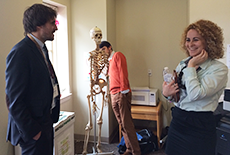 First-year students Kathryn Barbon and Alexia Loyless recently had dinner with a physician-intern who was 5,000 miles from home – and who made quite an impression on them.
First-year students Kathryn Barbon and Alexia Loyless recently had dinner with a physician-intern who was 5,000 miles from home – and who made quite an impression on them.
Kateryna Telehina (pictured right), who visited the College of Medicine in February, is finishing her medical training in a small town near Kiev, while pursuing a
graduate degree in public health and lobbying the Ukrainian parliament for health-care reform. But she must be innovative with the resources available to her.
“They’re lacking in equipment for training both for education and health-care delivery,” said Senior Associate Dean Myra Hurt, who joined them at the dinner. “They have great needs. Kateryna said they have a lot of people in the practice of health care, but they don’t have the latest cutting-edge equipment and medicines.”
Telehina, 24, was accepted for an exchange program for post-Soviet countries through the Open World Leadership Center. She was among seven delegates pursuing health-care reform in Ukraine accepted for the U.S. trip, with stops in Washington, D.C., and Tallahassee. Their FSU activities were arranged by the Osher Lifelong Learning Institute (OLLI), whose Friendship Force International volunteers hosted the delegates. Telehina has traveled to several European countries and the United Arab Emirates, but this was her first experience in the States.
“She was talking to us about her visit to the college the entire time,” said Barbon. “She kept saying, ‘You guys are so lucky.’ It made me really grateful for being able to go to school here.”
The students and Hurt observed Telehina’s repeated observations about technological disparities.
“We have the idea that people over there have universal health care,” said Hurt, “but the care is different from what we have. I think they have a lot of people that are trained in the finer arts – listening and the healing arts – but they don’t necessarily have all the technology that we have.”
While appreciative of technology, Loyless also saw the advantages of Telehina’s training.
“They’re more trained with their ears and their hands and their eyes,” said Loyless. “They’re very intuitive in that way. Kateryna said they don’t have the manikins to hear heart murmurs, so they have to figure it out on their own. It benefits her.”
They also noticed what Telehina did not talk about.
“Ukraine is a place that I read about every day in the newspaper that has this horrible sectarian violence going on, and the Russians are taking advantage of that,” said Hurt. “And here’s this young woman who works in a little town delivering health care near Kiev. That disconnect between knowing what was going on in her country, and this very normal person who cares a lot about her profession, struck me. I was kind of awed.”
- About Us About Us
- Campuses Campuses
-
Academics
Academics
- Departments
- Degree Programs
- Divisions / Offices
- Residency Programs
-
Centers & Institutes
- Area Health Education Center
- Autism Institute
- Center for Behavioral Health Integration
- Center for Brain Repair
- Center for Child Stress & Health
- Center on Global Health
- Center for Medicine and Public Health
- Center for Rural Health Research & Policy
- Center for Translational Behavioral Science
- Institute for Pediatric Rare Diseases
- Education & Clinical Centers
- Admissions Admissions
-
Research
Research
- Division of Research
- Ph.D. Program
- Quick Links for Medical Research
-
Centers & Institutes
- Area Health Education Center
- Autism Institute
- Center for Behavioral Health Integration
- Center for Brain Repair
- Center for Child Stress & Health
- Center on Global Health
- Center for Innovative Collaboration in Medicine & Law
- Center for Medicine and Public Health
- Center on Patient Safety
- Center for Rural Health Research & Policy
- Center for Translational Behavioral Science
- Institute for Pediatric Rare Diseases
- Translational Science Laboratory
- NCRT-CE Research Services
- Sponsored Funding Assistance
- Library
- Giving


